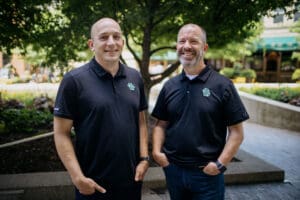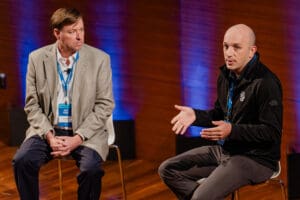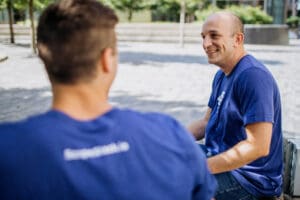For Jon Scott of ScopeStack, it’s all about connections. Connections have not only had a major influence on the success of his business but they’re integral to his company culture. Being fully remote, he believes it’s important to intentionally plan moments to connect with colleagues, as well as the community. Most of their team is located in Greenville – they didn’t want an office but they wanted the option to all meet in person. Flexibility is great but proximity is helpful to accomplish this. They are intentional about their values, being upfront from the beginning of each hiring process. They believe in authenticity and being action-oriented as well as giving back to their community through serving.
There has to be a better way.

Jon remembers sitting in a hotel room when Andy sent a prototype over to him. “I clicked on it and it sent me a statement of work. Wow, that’s legit!” It gave him hope that it could be bigger than a little side project. Jon was used to having a lot of ideas but this one felt right and even his wife agreed!
ScopeStack launched in 2018.
In March of 2018, they onboarded their first client, who is still on the platform today. A testament to the great service ScopeStack is known for.
Although Jon had been around the business and tech world, this was his first startup. When asked what the biggest learning curve was, he referenced all the hats entrepreneurs have to wear. There is a lot of learning to be done and for Jon and Andy, it was important to pursue and maintain a high level of integrity.
“I don’t have all the answers and I need to have people around me that I can ask questions.” Jon started with the NEXT VMS program early on in the business. He remembers pitching the idea in front of the mentors. It immediately clicked for Scott Millwood, former board chair and mentor, who knew the problem they were solving because he lived it.
You need to sell something!
ScopeStack ended up with a core group of experienced advisors. In their first meeting, Jon mentioned that he would not be able to pay himself. Their advice? Well, you need to sell something! More than just advice, the connections made through that mentor network were critical. A member of their executive team was a direct connection from these initial mentors and he has been an amazing addition. “We never would have made these critical connections if not for our mentors. Everyone has always been super supportive at every single stage.”

His relationship with Cliff started as more of a mentor/mentee relationship which did put Cliff in an interesting position. Oftentimes his investor goals did not align with his mentor’s guidance. The transparency on both sides of this relationship helped build a lot of trust in the relationship so when it was time to raise, they both knew what they were getting into.
Building relationships and trust before the ask.
SCRA was a great partner to ScopeStack as well. They received two rounds of grant funding which is a great option for a capital infusion early on. Why did they raise? They had hit $1MM in revenue, were cash flow positive, had lots of runway, and wanted to scale faster. To do this, they wanted to build a team to take them to the next level. SCRA and Cultivation Capital worked together with ScopeStack’s round. The fact that they all knew each other and had strong relationships was critical to making the raise successful. It took about a year and a half to close the round but the time it took to build relationships was worth it.
Jon got his undergraduate degree in business focusing on computer information systems from Anderson University, where he was recruited to play soccer. (He is one of those rare people actually using their degree!) Jon has leaned on those Anderson connections as he has built the business. He also received an MBA from North Greenville University. But, he says that nothing can beat the education he has received over the last several years as a business owner. “I have learned so much. How to set expectations to how to have difficult conversations. I’m so grateful even though it was really hard.”
Overcoming challenges and decisions fatigue

Now with a bigger team, they have additional expenses so the focus is on sales. Their number one thing to solve is the top of the funnel – how do you get more leads in the door? It’s a math game. You have to have so many leads to get so much revenue. This is a common challenge for founders.
Learning to delegate is a skill that entrepreneurs must master to scale their companies. As you grow a team, understand the difference between accountability and responsibility. Jon spends time focusing on the accountability chart – this helps set the appropriate expectations for the team as well as lead to delegation when possible or necessary. In 2023, Jon led a Founders Founder on the Entrepreneurial Operating (EOS) system that he uses day in and day out. Figuring all of this out is what keeps Jon coming to work every day.
Don’t overcomplicate it.
One of the best pieces of advice he has received is: “Don’t confuse important decisions with difficult decisions.” In other words, don’t overcomplicate it. Clarity seems to be key. Jon loves the challenge of a puzzle, turning chaos into clarity. He loves how quickly they can move as a startup, and how nimble they can be. And, he appreciates that while he is a visionary, he’s found a great complement in co-founder Andy who is wired to get things done.
Jon will never forget the moment it hit him that they had a real business. They had multiple customers and had landed their first enterprise account. People were actually paying them! He encourages business owners to put money back into the business. Companies will never grow if they don’t invest back in themselves.

